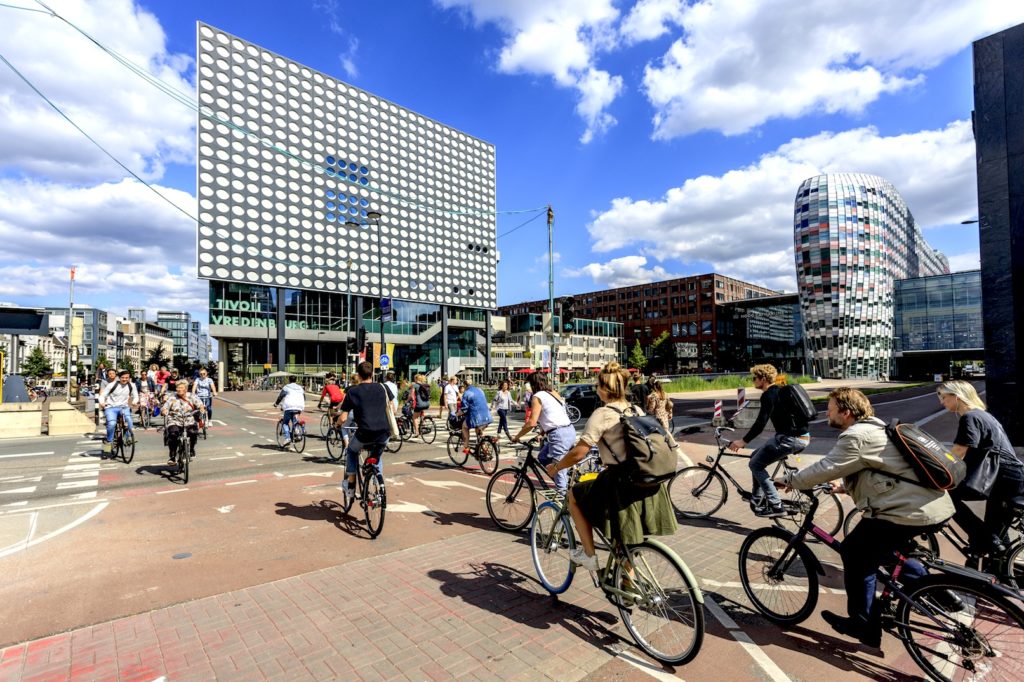World leaders must commit to boosting cycling levels to reduce carbon emissions and reach global climate goals quickly and effectively

The world needs much more cycling if we are to combat climate change. Without quicker and more determined action by governments worldwide to cut transport carbon emissions, we will be dooming present and future generations to a world that is more hostile and much less inhabitable.
This is why we, the undersigned 64 organisations, strongly appeal to all governments and leaders attending the 26th United Nations Climate Change Conference (COP26) in Glasgow to commit to significantly increasing the number of people who cycle in their countries. Governments can do this by building more high-quality cycling infrastructure, integrating cycling with public transport, improving road safety and implementing policies that encourage people and businesses to replace automobile trips with bicycle trips and other modes like walking and public transport. Promoting and enabling active mobility must be a cornerstone of global, national and local strategies to meet net-zero carbon targets.
Worldwide, transportation is responsible for 24% of direct CO₂ emissions from fuel combustion. Road vehicles account for nearly three quarters of transport CO₂ emissions, and these numbers are not decreasing. Aside from the unsustainable levels of CO₂ emissions that are ruining Earth’s climate, road vehicles are polluting our air at unprecedented levels, killing an estimated seven million people worldwide every year.
The Intergovernmental Panel on Climate Change (IPCC) “Global Warming of 1.5 °C” special report has identified cycling as a pathway to ensuring a safe and sustainable world for everyone, both now and in the future. Bicycle use produces zero emissionsand cycling delivers far-reaching positive socioeconomic impacts in addition to reduced pollution.
Cycling represents one of humanity’s greatest hopes for a shift towards a zero-carbon future. New research shows that life-cycle CO₂ emissions drop by 14% per additional cycling trip and by 62% for each avoided car trip. Switching from a car to a bicycle saves 150g of CO₂ per kilometre. E-cargo bikes cut carbon emissions by 90%compared with diesel vans. Swapping the car in cities for walking and cycling even just one day a week can reduce your carbon footprint by about half a tonne of CO₂ over a year. Building synergies with other travel modes such as public transport can critically enhance this potential.
Our world is on fire. We must urgently leverage the solutions that cycling offers by radically scaling up its use. What we need now is for governments to politically and financially commit to more, safer and integrated cycling that is equitable for everyone living in our countries, cities and regions. We urge all governments and leaders at COP26 to:
- Declare commitments to significantly boost cycling levels at home. This can be done by:
- Promoting cycling in all its forms, including cycling tourism, sports cycling, bike sharing, riding to work or school and for exercising
- Recognising cycling as a climate solution, establishing a clear link between how an increase in bicycle trips and a decrease in private car trips reduce CO₂ emissions
- Creating and financing national cycling strategies and collecting data on cycling to know where improvements in infrastructure and usage can be made
- Focusing investments on building safe and high-quality cycling infrastructure and in incentives for communities historically marginalised from cycling
- Providing direct incentives for people and businesses to switch from automobiles to bicycles for more of their daily trips
- Building synergies with public transport and foster combined mobility solutions for a multimodal ecosystem capable of covering all user needs without relying on a private car
- Collectively commit to achieving a global target of higher cycling levels. More cycling in a handful of countries will not be enough to reduce global CO₂ emissions. All countries must contribute, and these efforts must be tracked at the UN level.
There is no conceivable way or governments to reduce CO₂ emissions quickly enough to avoid the worst of the climate crisis without significantly more cycling. Cycling is one of the best solutions we already have to ensure our planet is habitable for all generations to come.
November 2, 2021 - Join the 64 Signatories here.
















